
For the first time, two leading Israeli human rights groups — B’Tselem and Physicians for Human Rights Israel — have accused Israel of committing genocide in Gaza. B’Tselem’s report, “Our Genocide,” says, “Israel is taking coordinated action to intentionally destroy Palestinian society in the Gaza Strip.” We speak with B’Tselem’s outreach director, Sarit Michaeli, in Tel Aviv, who says Israel’s actions in Gaza are “the textbook definition of genocide.”
Transcript
AMY GOODMAN: I’m Amy Goodman. This is Democracy Now!
Two leading Israeli human rights groups — B’Tselem and Physicians for Human Rights Israel — have accused Israel of genocide in Gaza. Yuli Novak, the executive director of B’Tselem, spoke in Jerusalem Monday.
YULI NOVAK: The report we are publishing today is one we never imagined we would have to write. But in recent months, we have witnessed — we have been witnessing a reality that has left us no choice but to acknowledge the truth: Israel is committing genocide against the Palestinians in the Gaza Strip.
AMY GOODMAN: We’re joined right now by Sarit Michaeli, international outreach director for the Israeli group B’Tselem.
Welcome back to Democracy Now! Explain your findings at this point.
SARIT MICHAELI: Thank you, Amy.
Yes, the report we issued yesterday essentially finds that Israel’s policies in the Gaza Strip, their catastrophic consequences, together with statements by senior Israelis, together with the documentation of what these statements led to, points us to the unequivocal conclusion that Israel is taking a systematic, organized action to destroy Palestinian society in Gaza. And this is the textbook definition of genocide. The report also says that this action by Israel is a reflection of a genocidal regime, and therefore there is also a grave risk that, given certain circumstances, the genocide, Israel’s actions will spread to other areas where Palestinians live under Israel’s control.
AMY GOODMAN: This isn’t the first time B’Tselem has been the first Israeli group to speak out. In 2021, you called Israel an apartheid regime. Lay out your findings, what you document, what you call the “clear, intentional attack on civilians in order to destroy a group.”
SARIT MICHAELI: Yes, so, first of all, we rely both on witness testimonies collected by our field researchers in Gaza, who have been evacuated but continue to collect information and personal accounts from Palestinians in the Gaza Strip, but we also rely on credible information from many other sources. So, this is the body of information.
We then looked at what Israeli policymakers said. And we, in fact, provided a very long list of these statements. And essentially, there is no — there’s nothing that has happened that wasn’t stated openly by Israeli policymakers, the catastrophic, the horrific consequences of this, that we list in our report. Aside from the huge, massive killing of civilians — you discussed it earlier in the program — reaching up to at least 60,000 people, of them tens of thousands of women and children, there is also the mass starvation now, as a matter of policy by Israel, of 2 million Gazans. There is the destruction, the razing of entire cities. There is a destruction of everything that is necessary to maintain human life. This is what we see in Gaza, and none of it was a secret. It’s been known for months. And, I mean, this has been going on for 22 months. Israeli policies have been clear.
Yet this has not led to a concerted, to effective international action to stop this. And one of the things we say in the report, and one of the things we called for, together with our colleagues from Physicians for Human Rights Israel yesterday, is for the international community, as well as Israelis, to take all action in the framework of international law to get this to stop, to get this to end.
Now, yes, B’Tselem is an Israeli organization. We are based in Israel. And we’re also made up of Israelis and Palestinians. And I think one of the important novelties or the things that we say in this report that breaks new ground is not just the discussion of what’s happening on the ground right now in Gaza, but the discussion of the root causes of this Israeli genocide. And we call the report “Our Genocide.” We look at the history, and we also look at this horrific, horrendous trigger of October 7th. The Hamas atrocities that were perpetrated against Israeli civilians and have led to this terrible trauma that Israelis feel were then exploited cynically by our government in order to push policies that the government and very powerful members of our government have been trying to promote even before, as I said, this massacre of October 7th.
So, the report essentially looks at not just the reality on the ground right now, but looks at why we have been — how, what made it possible for us to reach this horrendous stage, where Israel is perpetrating genocide, where the international community is not stopping this, where Israelis, the majority of Israelis, are either silent or supportive of this genocide, and what can we say and do as people inside Israel, both Israelis and Palestinians who are operating within Israeli civil society, in order to stop it now.
AMY GOODMAN: As we reported in headlines, just yesterday, on Monday, in the occupied West Bank, an Israeli settler shot and killed the Palestinian activist and teacher, 31-year-old Odeh Muhammad Hadalin, who played a key role in the production of the Oscar-winning documentary No Other Land. Residents identified his killer as Yinon Levi, an Israeli settler who was sanctioned by the Biden administration. The Trump administration lifted those sanctions. There’s videos showing him firing a gun. Talk about the significance of this, and the violence in the West Bank, as well. We just have 30 seconds.
SARIT MICHAELI: Yes, absolutely. I think, first of all — so, I think this is just a clear example of how exposed Palestinian lives are under Israeli occupation and apartheid, both in the West Bank and certainly in Gaza. The lack of any consequences — we expect Yinon Levi to not have to pay a significant price — is the result of policy, and it’s also the result of international inaction. And it is so symbolic that the Trump administration essentially lifted the sanctions, the very meager sanctions, that were imposed by the Biden administration on this individual. But it’s an entire system of impunity and support for this settler terror that has been responsible and that we see as responsible for the killing of dear Odeh Hadalin, who was really a friend to us all. Anyone who was active in the Masafer Yatta area knew Odeh, stayed with him, spent time with him and listened to him. He was an inspiring —
AMY GOODMAN: Sarit Michaeli —
SARIT MICHAELI: — and amazing activist, and his death was simply shocking.
AMY GOODMAN: — we’re going to have to leave it there. I thank you for being with us, with the Israeli human rights group B’Tselem.

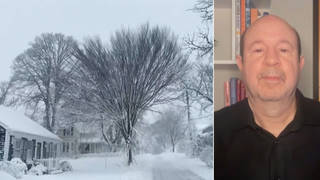
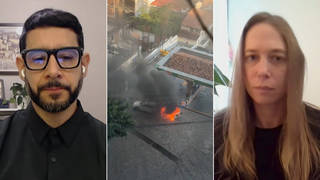
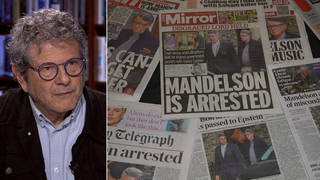
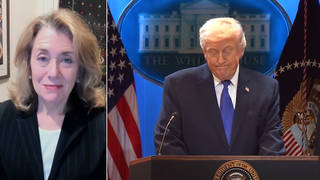





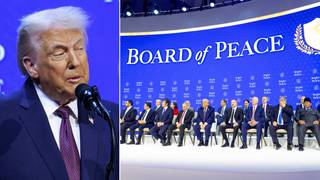
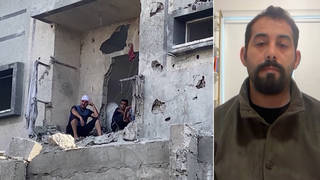
Media Options